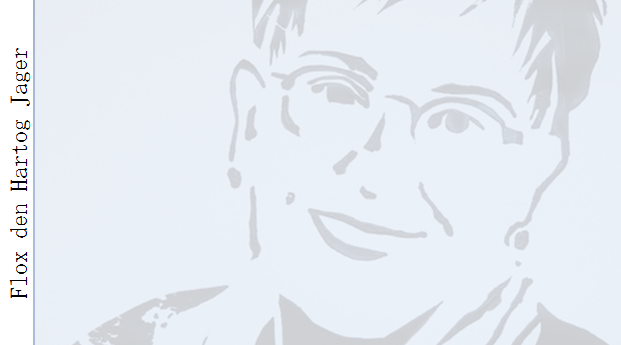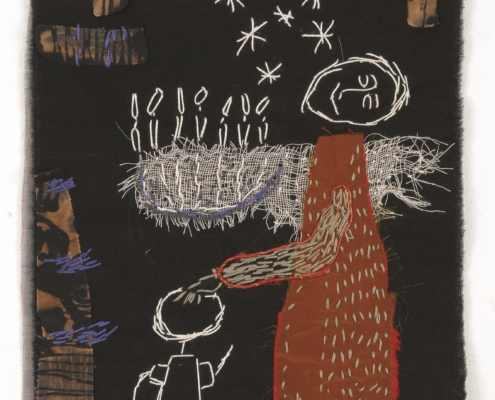Een jaar lang maakte ik kleine werkjes met als uitgangspunt het werk van de 8e eeuwse monnik Beatus over de Apocalyps. Zijn Commentaar op de Apocalyps van Johannes werd gedurende vele eeuwen gekopieerd. Daardoor zijn er uit verschillende eeuwen kopieën bewaard gebleven.
De titel verwijst naar de twee getallen die veelvuldig voorkomen in de Apocalyps: de zeven en de twaalf. Daarbij geeft de zeven nog een “ontwikkeling” aan, maar is de tijd bij de twaalf ruimte geworden. Zeven is het getal van de wording – een ritme dat een cyclus wordt. Het gaat om de zeven sterren, de zeven gouden luchters, de zeven brieven, de zeven zegels, de zeven bazuinen en de zeven schalen. De twaalf klinkt door in de 4 cherubijnse dieren, de vierentwintig oudsten rond de troon, de 144.000 en de twaalf poorten van de hemelse stad. Twaalf is punt waar tijd ruimte wordt – het ogenblik, waarin de dingen als in een flits allemaal tegelijk gebeuren, het gebied van de eeuwige duur. Deze eeuwige duur werd voor mij duidelijk in de vorm die het hemelse Jeruzalem heeft gekregen in het boek van Beatus: vredig, helder, transparant, prachtig, perfect, maar zonder ontwikkeling en dus statisch. Dus lijkt ook het hemelse Jeruzalem onderworpen aan wat is gaan heten de utopische paradox. Wat perfect is moet je niet meer veranderen.
Ondanks het feit dat de ontwikkeling in de Apocalyps zeer gewelddadig is, want een katharsis van al het oude en slechte voorafgaand aan de komst van het nieuwe en goede, voel ik meer voor die cyclus van worden dan voor de perfecte, eeuwig gelijke staat.
During one year I worked on the book of the 8th century monk Beatus, who wrote a Commentary on the Apocalyps of John.
The title “Seven to Twelve” refers to the two numbers that occur frequently in the Apocalypse: the seven and the twelve. The seven indicates a “development”, but time has stopped in the number twelve. Seven is the number of a rhytmic cycle, of becoming. There are the seven stars, the seven golden candlesticks, seven letters, seven seals, seven trumpets and seven bowls in the Apocalyps. The twelve is echoed in the four cherubinic animals, the twenty-four elders around the throne, the 144,000 and the twelve gates of the heavenly city. Twelve refers to the point where time has become space – the moment in which things happen as in a flash all at once, in the eternal duration. This eternal duration became clear to me in the form that the heavenly Jerusalem has been given in the book of Beatus: peaceful, clear, transparent, beautiful, perfect, but without development and therefore static. Hence the heavenly Jerusalem is according to me subject to what has been called the utopian paradox. Despite the fact that the development in the Apocalypse is very violent, as it is a catharsis of all the old and poor prior to the arrival of the new and good, I myself feel more at ease with the cycle of becoming than with the perfect, eternal state.













